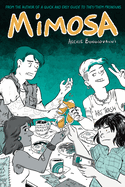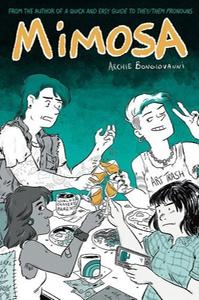
 Archie Bongiovanni (Grease Bats; A Quick & Easy Guide to They/Them Pronouns) takes on friendship and queer community in Mimosa, a thought-provoking, emotional graphic novel about four queer 30-somethings in Minneapolis. Bongiovanni introduces the longtime friends as they exchange ribald stories over brunch: nonprofit staffer Elise, parent blogger Chris, artist Alex, performer and instructor Jo. Chris describes their difficulty finding a partner, citing their divorced single parent status and looming 40th birthday as non-starters for the young queer scene. The group rallies around them and decides to host "Grind," a dance night specifically for "mature queers," with proceeds going to Elise's queer community nonprofit Relief and Rescue.
Archie Bongiovanni (Grease Bats; A Quick & Easy Guide to They/Them Pronouns) takes on friendship and queer community in Mimosa, a thought-provoking, emotional graphic novel about four queer 30-somethings in Minneapolis. Bongiovanni introduces the longtime friends as they exchange ribald stories over brunch: nonprofit staffer Elise, parent blogger Chris, artist Alex, performer and instructor Jo. Chris describes their difficulty finding a partner, citing their divorced single parent status and looming 40th birthday as non-starters for the young queer scene. The group rallies around them and decides to host "Grind," a dance night specifically for "mature queers," with proceeds going to Elise's queer community nonprofit Relief and Rescue.
Grind is wildly successful, but the party exposes problems the group has been ignoring. Some of Jo's Queerrr Rock Camp students show up, to her chagrin, so she leaves without performing her topless act. Jo is upset, but Alex doesn't notice or doesn't care. Chris is alienated again, and Elise ignores their warnings and spends the night on a not-date with her boss. As the story continues, the four withdraw from and collide with each other, allowing them to reflect on years together and what they want for themselves.
Readers will want to linger on Bongiovanni's vibrant montage scenes and hurry past some of the vividly rendered arguments, but each page is worth sitting with. They use the sequential art format to great effect, providing background for each character in mundane scenery. For example, a frame hanging on frequently misgendered Chris's wall shows that their blog, "Parenting Beyond the Binary," was named the "#1 Mommy Blog of the Year 2017."
Mimosa is messy, a bit raunchy and sometimes infuriating. Bongiovanni steps outside the narrative of the "acceptable gay" and presents a flawed cast, with their mistakes and arguments at the fore. They seamlessly incorporate sex work, generational wealth, transphobia, ageism and more into the narrative and illustrate how the characters experience the same hardships unevenly. Whether read as a cautionary tale about the maintenance of adult friendship or as an observation of the ways in which friendships change over time, this is an insightful meditation on the idea of growing up as a grown-up. Chosen families are often formed due to proximity, convenience or aligned priorities, so what does it mean when some of those factors shift?
Funny, sad, frustrating, hopeful, contemplative and crass, Mimosa is unreservedly queer and broadly accessible. An excellent pick for anyone who has or has been a friend. --Suzanne Krohn, librarian and freelance reviewer
Shelf Talker: Rowdy, melancholy and insightful, Mimosa follows four queer 30-somethings as they take stock of their relationships and the community they've built together.

